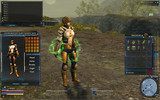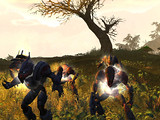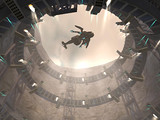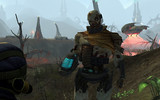Starr Long Interview - Part 2 (July 2007)
Starr Long Interview - Part 2
JeuxOnLine: It looks like Tabula Rasa will have very dynamic ever-changing battlefields where great battles will take place. These battlefields will apparently be associated with instanced missions that could have impact on them. Don’t you fear players might want to concentrate on these instanced missions, playing in solo or with the same small group of people, at the cost of the “regular” areas that could regroup a lot more players, supporting a better environment for roleplay and more generally social interactions?

Starr Long: That's another good question. So it's basically: are the instance spaces and the story driven kind of things going to compete with the battlefield activities?
We think that we have a really great balance and mix between the two. And so we think that what we've seen in our beta-testing is that, because they're very intertwined with each others for instance.
To get that mission, to get into that instance space at all, requires in some cases a control point to be owned by the good guys. So there may be a case where even if for instance there's a certain type of player that might favor or want to spend all their time in the instance spaces at the expense of the battlefields, well we've engineered it so they may not even have that choice necessarily.
Because of the dynamic nature of the battlefield, if they want that mission, they're going to have to work in the battlefield to get it and work with the other players and so even once they got that mission and they go on completing it and they come back out of the instance space and want to turn in again, the base may be taken over and so. It won't be all the time, but there's always that chance and so.
One of the hallmark of our game is the game keeps you on your toes and keeps you thinking more quickly and more often than other online games. You can't always count on things being the same every time. I think that it won't so much be a competition because they're linked so closely that it would be impossible for you to favor one or the other.
JOL: Banes were able to build spatial ships, murderous weapons of mass destruction and some of the best armors of the universe. What do you think can explain why they never thought about wearing clothes?
JOL: Yes, they're always naked with some kind of armors, but we never saw them wearing pants, wearing some nice things, like any advanced civilization would do!
JOL: We already know that player vehicles won’t make it for the initial release, but it has already been stated that there was hope to add them shortly after. What is your view on vehicles in a game such as Tabula Rasa? How will you manage to avoid unbalancing the game especially in PvP?

S.L.: That's a great question. Vehicles are something a lot of us on the team are very passioned about and we we really want to do it right and, like you said, we want to make sure it doesn't imbalance the game.
There are examples that I can point to, a lot of a multi-player game where if there are vehicles in the battle space, soldiers are pretty much useless because you can just run them over basically with a tank.
We really want to make sure that there are pluses and minuses to vehicles that balance out with being just a foot soldier and so we wanted to really take the time to do it right, but we're building all the assets to be ready to do that. You'll actually even see in some of the videos and when you're playing the game, you'll see like big Mech walking around there are actually garages in the bases, so we're doing all the prep for it but in order to take the time to balance it correctly we decided to not ship with it, just to make sure we could address exactly what you're saying, that it will be balanced.
There will be certain player skills that will be able to defend or disable vehicles even if you're not in a vehicle yourself. The cost to operate a vehicle will be maybe higher then you just operating your armor and weapons, because there is durability of items in the game. There will be some balancing issues that we hope will make it to keep things even, but that going to take more time that we have to ship.
JOL: Tabula Rasa is at a crossroad between FPS and RPG. You must most definitely hope to attract both RPG and FPS players with Tabula Rasa. But trying to please everyone, are you not afraid to please no one?

S.L.:Yes, that was a big dilemma for us, so we made a very conscious decision a while back that what we're really making is a role-playing game and we're targeting people who play role-playing game. However we're upping the level of action quite a bit. And so while there may be people who like shooters who would want to play the game, there are a lot of mechanisms... it's not a shooter, it's not reflex-based.
It is at its core a role-playing game, so your character skills... I mean there is a fire-arm ability, there is a light-armor ability, there is a medium-armor ability that build up upon time, that very greatly effects how much damages you do. There are levels of weapon, there are different damage types of weapon like electricity and sonic and fire and ice, and your character goes up in levels and that also have effects. But there are some real-time elements in there like... Am I standing? Am I crunching? Am I in behind cover, like behind a sand bag? Am I moving? Am I standing still? So there are some real-time elements but it's still at its heart a role-playing game.
I agree with you totally that if we had really tried to do both that we probably would not have been able to please everyone. So we're trying to create a role-playing game with the pace of an action game, but not an action game. We're trying really to be careful in how we communicate going forward saying we're not a shooter even though in many ways some of our interface elements and a piece of it feel like that and yes you are shooting guns and things like that but it really is a role-playing game.
JOL: When I look at Tabula Rasa, I see strong conceptual similarities with the Ultima series. For instance, the Logos obviously take their roots in the Ultima Runic Alphabet, at least conceptually. And far away from others MMOs that multiply races, you stand with only one player race, the notorious humans.
On the other side, one central pillar of the Ultima lore seems to be missing – and I'm not talking about the medieval setting – I'm talking about the virtues of course and more generally the underlying concept behind them: the ethical and moral questions and choices the players have to face.
Tabula Rasa gives a great importance to stories and to the player interactions with the story. We will most certainly not see an equivalent to the virtue system in Tabula Rasa, but what can we expect about moral and ethical decisions in the game? And, more generally, what others similarities do you see between Tabula Rasa and your previous games?

S.L.: I think there's are two main similarities between what we've done in the past and what we're doing with Tabula Rasa. The first and the biggest one I think is the concept of ethical parables. In most online games when you get a mission from an NPC it's pretty much do whatever it says or, in many cases, don't even read what the mission says, just look at what the little objective on your mission list is and go and complete that, and then you're done. And while there are some of those in our game, there are also ones where you are presented with kind of an ethical parable where it's not so “just do what you're told”, you actually have to think about it and if you just do exactly what you're told and don't pay attention to what someone is saying, there will be consequences to those actions.
A great example we talk about is that... and you encounter this very early on, you're wandering throughout a military base and there is a guy behind a building and he gestures you over and you go talk to him and he tell you “I've got some stim dust that you could take out to the troops on battlefield that will help those guys last longer, stay up longer and they're willing to pay quite a bit of money for it, so you do want to help me out ?” But then at the same time, while you're wandering through the base you will talk to the medical personnel and they will be like “Hey! We've got this shortage of medical supplies for patients” and you will talk to the base commander and he's like “Hey you know, I think someone is stealing medical supplies and I really want to find him out, so I can take care of this and prosecute them.”. So you're presented with this choice : do I take the stim dust out to the battlefield and help those troops out there maybe last a little longer or do I turn in this guy who's asking me to do this to the base commander, but then the soldiers are going to resent me for that, for betraying their trust and for being a rat. It's not necessarily a black and white choice, because there's pluses and minus to all those and so you're presented with this sort of ethical dilemma of what's the right choice, and it really make you think.
Another example might be the military send you on this mission to go take out this hydroelectric dam and flood this valley to prevent some troop movement. You go there to blow it up and you notice, oh there is a native village right at the bottom of this dam and if I blow it up, yes it will stop the troop movement but it may wipe out this village. And I'm on a time-limit. So do I take the time to go warn the village? Do I just blow up the dam? It's like “do I strictly obey orders?” in a candid sort of one ethical parable of what's the right choice. Well,sometime there isn't a very clear right choice and I think that's a very signature element that we carry from things you tried to do with the Ultima series, that were inspired by many sources like The Prophet by Kahlil Gilbran.
I think it's thats the biggest one, but in addition, like you mentioned, there is the Logos language. Richard created this entire anew alien language not only used for telling lore in the game – you'll see it written on objects in the game that will tell you stories about the aliens in the history of the game and the lore – but there are also part of the game mechanic where as you collect them they are what unlocks your super-powers. Not only do you shoot riffles and grenade launchers and flamethrowers, but you also have super-powers. You can shoot lightning out of your fists, you can release waves of concussive force, you can frighten enemies away... But to use those powers you have to go around and discover these Logos symbols and to unlock them. Effectively you learn the words to unlock the power. Which is where it comes from. Logos literally means the “the spoken word has power” and that's part of the [inaudible].
I think those two elements are things that are harking back to our past and provide a depth of story and experience you won't necessarily see in most online games.
JOL: With millions of players, World of Warcraft is the leader of the MMO genre, in term of number at least. Almost everyone in the MMO industry dreams of such a success. Being the one who almost invented the genre ten years ago with Ultima Online, I'm pretty sure you have strong ambitions for your new MMO. What are the main reasons that make you firmly believe Tabula Rasa will push the genre to a next level?
And do you believe Tabula Rasa has what it take to break the million barrier, or even to become a multi-millions players game?

S.L.: World of Warcraft is as big as Lineage 1 and Lineage 2. That's definitely our goal as always to have millions of customers, that would be fantastic. I think much like Ultima Online helped evolved the genre and pretty much defined where it did today, I think some of the key elements we talked about in the interview - the ethical parables, the dynamic battlefields - are definitely going to be factors that will set us apart and give us the potential to create something new and really evolve the genre and bring in more customers.
But one we have not talked about yet and I think will be key to that and will be different than all the other ones... In most of these online games - the structured online games and not the world simulations, games like World of Warcraft, EverQuest, Guild Wars, Lineage - when you start the game, you pick your character class. That's a decision, for the most part, that you make before you ever played the game. You might not necessarily know what's going to be your favorite play-style. Do I like playing a wizard? Do I like playing a warrior? Well, since that's a different sort of game you may not know. When it's happening you pick whatever class you think you like, you play it, and then you may discover : “Woo, I'm not so excited about that, I want to play a different one.”. When that happens you have to start over. Everything you've done to that point is lost.
In our game, instead of deciding what class you are at the beginning, everyone starts off as a recruit. They're just a basic soldier and they can shoot guns, wear armors, they have one super-power. And then, at level 5, you pick a specialization. Do I want to be a soldier or a specialist? Soldier are more front-line guy, specialist is more support like healing and engineering. And then, at later level, you pick a further specialization under one of those. So,it's an advancing branching character tree versus clear defined split up character class at the beginning. And that lets it so the player is always making what we call an informed decision. They have enough experience to know : “Oh I really like this style of gameplay, so that's the branch I'm going to take”. But what really set us apart is that, at any time during the advance you can create a clone of your character. That's an exact copy of that character. So, if I'm playing for long [inaudible] and I'm about to make that choice between soldier or specialist for instance, I can create a clone of my character so that even if I pick that soldier and I'd like to try a specialist a while, I don't have to start at level one, I'll start wherever I made that clone, before I made that choice.
All those clones share a footlocker, a common little inventory. You can dump equipment in from one clone into the other one and share that back and fore.
It allows people to explore the game, try different characters, try different load-out and things like that and decide : I like this, I like that.
Essentially, we're the first online game that has a save-game system. I think that it will allow people who may have been intimidated by having to make a bunch of choices at the beginning, it's a much simpler gentler start to the game that might hopefully appeal to a larger audience.
Réactions
Pas de compte JeuxOnLine ?
Créer un compteQue pensiez-vous de Tabula Rasa ?
-
7 juin 2013
-
13 décembre 2011
-
26 octobre 2011
-
31 mai 2009
-
1 mars 2009

